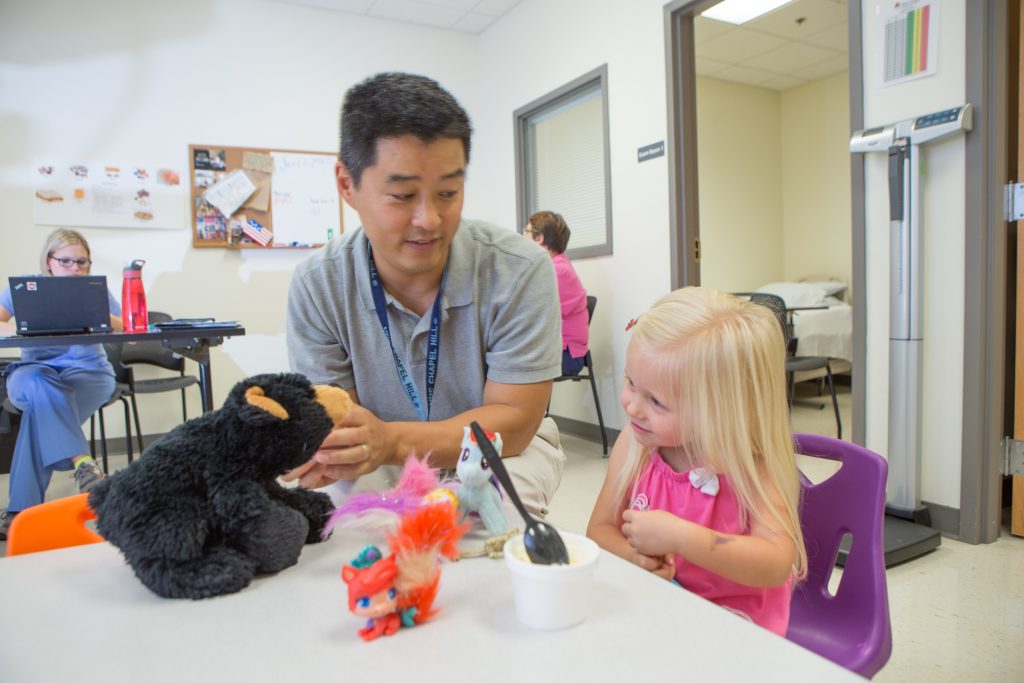Programs and Initiatives
Programs and Initiatives
Pediatric Physician Scientist Training ProgramThe Department of Pediatrics Physician Scientist Training Program (P-PSTP) supports physician-scientists through individualized research mentorship and research opportunities integrated with the clinical training of a typical residency or fellowship. The program also offers funding to attend national meetings and opportunity to apply to research funding. While the program is based in the Department of Pediatrics, P-PSTP residents and fellows can engage with research programs across the campus, and we encourage you to do so. Read more >>
Junior Faculty Development Are you interested in getting involved in research? One of our primary goals at the CRI is to serve as a gateway for junior faculty, to provide guidance and to leverage resources into results, regardless of your experience with research. Read more >>
UNC Food Allergy InitiativeFood allergies affect 4-6% of children in the United States, and those numbers continue to increase.1 The mechanism by which a person develops an allergy remains largely unknown. The UNC Food Allergy Initiative (FAI) was founded in 2012 to address the growing needs of adults and children with food allergies. The FAI team is made up of a multidisciplinary group of physicians, nurses and world-renowned researchers who are studying the biologic basis of food allergy in the laboratory and in clinical research studies in order to understand the allergic response, to develop translational models of food allergies and to develop oral immunotherapies. Read more >>
Program in Rare and Interstitial Lung DiseaseA rare disease in the United States is one that affects fewer than 200,000 people. Half of those with a rare disease is a child. Most rare lung diseases are genetic, such as primary ciliary dyskinesia and some types of interstitial lung disease, and symptoms can appear very early in life. Other types can be the result of other diseases, certain infections, or environmental exposures. The Rare Lung Disease Program is involved with several disease specific foundations and research networks. Investigators participate in or lead projects with the ultimate goal of improving the health of children with all types of lung disease.
Cystic FibrosisCystic fibrosis is a genetic condition in which the body does not produce or produces abnormal versions of a protein, cystic fibrosis transmembrane regulator (CFTR). Without this protein, mucus in the airways, gastrointestinal tract and pancreas becomes thickened, leading to loss of function. Cystic fibrosis is a rare disease and affects around 30,000 people in the United States. Researchers at the CRI are partnered with researchers at Marsico Lung Institute to focus on developing new standards of CF care, including new medications, infection control and palliative care. Read more>>
Other Research Areas of Interest
Inflammation and AutoimmunityInflammation is part of the body’s defense response to infectious disease or to tissue injury. However, prolonged inflammation or a sustained inflammatory response over time can result in damage to the body. The inflammatory response is a hallmark of a majority of diseases and disorders, including those common to childhood, such as asthma and allergies. In autoimmune diseases, the body’s immune system malfunctions and turns on itself. More than 80 diseases result from the immune system breaking down this way, including lupus, inflammatory bowel disease and type 1 diabetes.1 The CRI is home to a number of investigators who are working to better understand the human inflammatory response and create new treatments for autoimmune diseases.
Social Determinants of HealthSocial determinants of health are conditions that individuals and different groups of people experience that have a direct impact on a wide range of health and quality of life outcomes. These include economic stability (employment status, housing stability), education (early childhood education, enrollment in higher education), healthcare (access to healthcare, insurance coverage), social and community context (cohesion within a community, discrimination), and neighborhood/built environment (water/air quality, housing quality).1These factors impact many aspects of children’s health in the United States, including preventive healthcare, access to medications, and exposure to pollutants. In partnership with many other institutions across UNC’s campus, CRI researchers are working to understand and develop strategies to address poor health outcomes resultant from these factors.
Pediatric Gastroenterology ResearchCrohn’s disease and ulcerative colitis are types of inflammatory bowel disease (IBD), a chronic autoimmune disorder of the gastrointestinal tract that is usually diagnosed in a person’s late teens or early twenties, but can occur in younger children. Around 70,000 children in the United States are estimated to be living with IBD,1 and diagnosis rates in adults are on the rise.2 The CRI is collaborating with investigators to create a research environment that focuses on evaluating medication efficacy and easing disease burden on patients and their families.
Endocrinology and Diabetes1Rosen MJ, Dhawan A, Saeed SA. Inflammatory Bowel Disease in Children and Adolescents. JAMA Pediatr. 2015;169(11):1053–1060. doi:10.1001/jamapediatrics.2015.1982
2 Centers for Disease Control and Prevention
Around 208,000 people under the age of 20 are living with Type 1 or Type 2 diabetes, and rates of new diagnosed cases are on the rise, with an 1.8% increase per year (Type 1) and a 4.8% increase per year (Type 2) between 2002-2012.1 The CRI’s Endocrinology and Diabetes Initiative is working to ease the burden of care for children and young adults with diabetes, by developing new therapeutics, investigating preventative care and educating patients and their families.
